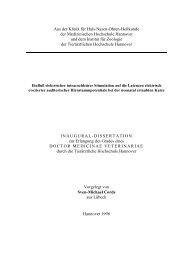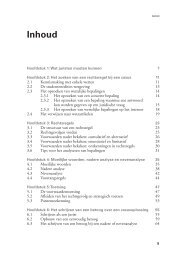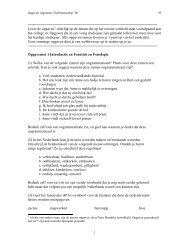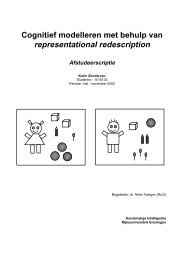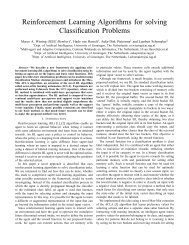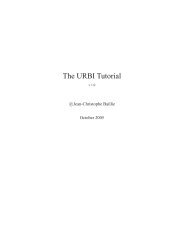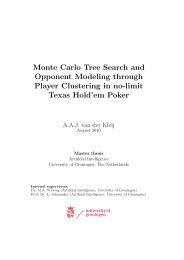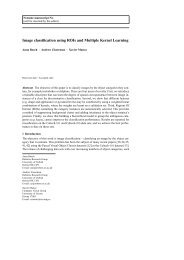Presuppositions in Spoken Discourse
Presuppositions in Spoken Discourse
Presuppositions in Spoken Discourse
You also want an ePaper? Increase the reach of your titles
YUMPU automatically turns print PDFs into web optimized ePapers that Google loves.
Accommodation and Presupposition<br />
discourse model they should be assum<strong>in</strong>g. This could be a reason for why<br />
presupposition can present hearer-new <strong>in</strong>formation.<br />
The appropriateness of communicat<strong>in</strong>g hearer-new <strong>in</strong>formation by<br />
accommodation seems to depend heavily on the trigger <strong>in</strong>volved and the context.<br />
Perhaps speakers don’t really care that they are communicat<strong>in</strong>g hearer-new<br />
<strong>in</strong>formation via presupposition. From the speaker’s perspective, the key is<br />
successful communication of the message. The hearer may have to do some<br />
“repairs” to correctly process this but if the presupposed <strong>in</strong>formation is<br />
semantically rich enough that accommodation can proceed without the danger of<br />
mis<strong>in</strong>terpretation on the part of the hearer, then it will be exploited by speakers.<br />
Trigger types seem to differ <strong>in</strong> the ease with which their <strong>in</strong>duced<br />
presuppositions can be accommodated as well as their tendency be resolved by<br />
accommodation. What underlies these differences, and does it have anyth<strong>in</strong>g to do<br />
with their appropriateness for communicat<strong>in</strong>g hearer-new <strong>in</strong>formation? This is the<br />
focus of the next section, which looks more closely at two proposals for expla<strong>in</strong><strong>in</strong>g<br />
what licenses accommodation and adds some observations from the corpus data.<br />
5.3 WHAT CHARACTERISTICS SUPPORT OR HINDER EASE OR TENDENCY TO<br />
ACCOMMODATE?<br />
In the corpus data we can see that different trigger types displayed very different<br />
tendencies to b<strong>in</strong>d or accommodate. This was predicted already <strong>in</strong> van der Sandt<br />
(1992) where he writes that “All (these) triggers are anaphoric <strong>in</strong> the same sense<br />
though they may differ <strong>in</strong> their capacity to accommodate” (p. 342). S<strong>in</strong>ce this paper<br />
Zeevat (to appear) has po<strong>in</strong>ted out that differences <strong>in</strong> the ease with which triggers<br />
accommodate are not treated systematically, if at all, <strong>in</strong> the satisfaction theory, or<br />
the b<strong>in</strong>d<strong>in</strong>g theory and its variations. In this section I’ll discuss what characteristics<br />
license accommodation, and what characteristics play a role <strong>in</strong> tendency to be<br />
accommodated. There are two proposed explanations: van der Sandt (1992) relates<br />
the ability to accommodate to the amount of descriptive content a presupposition<br />
has and Zeevat (1999) and Blutner (2000) argue that a lack of alternative<br />
expressions that do not need accommodation licenses accommodation.<br />
There are three groups of expressions that behave differently and whose<br />
differences should be accounted for <strong>in</strong> any proposal that claims to expla<strong>in</strong> what<br />
licenses accommodation. The first group is the class of traditional anaphors,<br />
represented by pronouns. Any explanation about the licens<strong>in</strong>g of accommodation<br />
<strong>in</strong> the b<strong>in</strong>d<strong>in</strong>g theory, or its variations, should expla<strong>in</strong> this class doesn’t<br />
accommodate. The B<strong>in</strong>d<strong>in</strong>g Theory treats anaphora as a subset of presupposition<br />
so they should have some explanation for why pronouns behave differently <strong>in</strong> this<br />
regard. 6<br />
6 I suppose an explanation as to why pronom<strong>in</strong>al anaphora don‘t accommodate is unnecessary<br />
for versions of the satisfaction theory because these theories don‘t treat anaphora and<br />
presupposition <strong>in</strong> the same way.<br />
117



